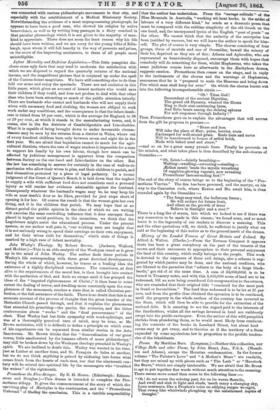John Wesley's Theology. By Robert Brown. (Jackson, Walford, and Hodder.)—This
is an able analysis of the Wesleyan creed as it grew
up in the mind of John Wesley. The author finds three periods in Wesley's life corresponding with three great doctrinal developments, during the whole of which, however, he traces as a leading idea the existence of a highly disciplined conscience. The conscience, at first alive to the requirements of the moral law, is then brought into contact wish the perfection of God, and finds no escape until it has grasped the ideas of the "imputed righteousness of Christ ;" it then loses to some extent the feeling of terror, and dwelling more constantly upon the com- pleteness of the atonement, reaches a state that is called Christian per- fection, or the full assurance of the faith. There is no doubt that this is an accurate account of the process of thought that the great founder of the Methodist Church passed through, and that it explains the phenomena that attended his preaching—the panics, the ecstacies, and the bitter controversies about "works " and the "final perseverance " of the elect. That Wesley had but little sympathy with word-splittings, and
was of a thoroughly practical turn of mind, may be true, as Mr. Brown maintains, still it is difficult to define a principle on which some of his experiences can be separated from similar stories in the Acta Sanctornm. Mr. Brown thinks that the " demoralization of our great towns, little ameliorated by the humane efforts of mere philanthropy," may still be broken down by the Wesleyan theology preached in Wesley's spirit We are inclined to doubt this. Wesley was wanted in his time, just as Luther at another time, and St. Francois de Sales at another, but we do not think anything is gained by stiffening into forms what comes fresh from the hearts of such men, nor that the nineteenth cen- tury will be stirred into spiritual life by the messenger& who "troubled the waters" of the eighteenth.






























 Previous page
Previous page